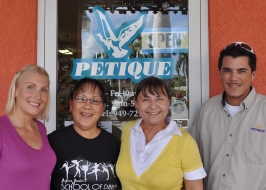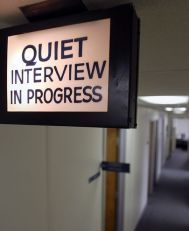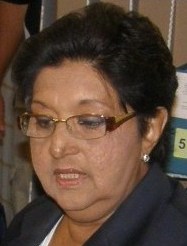Archive for August 17th, 2010

Daylight robbery in GT
 (CNS): Updated – The small Tortuga liquor store on the corner of Boilers Road along the George Town Harbour front is the latest victim of a daylight robbery. Police have now confirmed that around 3.30 pm today, Tuesday 17 August, a man armed with what appeared to be a handgun entered the Tortuga liquor store at the junction of Boilers Road and South Church Street. The robber threatened the two female members of staff before grabbing one of them and demanding cash. He left the premises with an undisclosed sum of cash and was last seen on Boilers Road heading towards Walkers Road on foot. No shots were fired and no-one was injured in the incident.
(CNS): Updated – The small Tortuga liquor store on the corner of Boilers Road along the George Town Harbour front is the latest victim of a daylight robbery. Police have now confirmed that around 3.30 pm today, Tuesday 17 August, a man armed with what appeared to be a handgun entered the Tortuga liquor store at the junction of Boilers Road and South Church Street. The robber threatened the two female members of staff before grabbing one of them and demanding cash. He left the premises with an undisclosed sum of cash and was last seen on Boilers Road heading towards Walkers Road on foot. No shots were fired and no-one was injured in the incident.
The suspect is described as being 5′ 9” in height dark complexion, medium built and spoke with a Jamaican / Caymanian accent. He was wearing a brown shirt, dark blue jeans, brown sunglasses and had a brown cap pulled low over his face.
Anyone who was in the area at the time of the robbery and witnessed the incident or the man leaving the scene is asked to call George Town CID on 949-4222 or the confidential Crime Stoppers number 800- TIPS. (8477)
Murder conviction quashed
(CNS): Full update — The Cayman Islands Court of Appeal has overturned the conviction of William McLaughlin Martinez for the murder of Brian Rankine Carter and remitted the case back to the Grand Court for retrial. The court allowed the appeal on Tuesday citing a misdirection by the trial judge to the jury. The defence team had put forwardtwo grounds for appeal: one was that the judge had given the wrong direction when the jury came back after retiring with a question and the second concerned a machete which fell out of the police chain of evidence. The president of the appeal court, Sir John Chadwick, said the court was satisfied that the appeal should be allowed on the first count alone.
Although the three appeal court judges briefly announced their decision from the bench, the president said the reasons would be placed in writing.
During the morning’s argument leading defence counsel set out their argument, which centred on a question asked by the jury some 25 minutes after the judge had finished his directions and the jury had been sent to deliberate.
The crown’s case against Martinez had depended heavily on the witness testimony of Jason Hinds, who was present on the night of the murder, 20 July 2009. Hinds, who was later convicted of accessory after the fact, had accused Martinez of the crime, and although he admitted being at the scene, he denied being a willing accomplice.
When Justice Alex Henderson summed up the case for the jury before they were sent to deliberate, among the many directions he gave he said the crux of the case depended on the testimony of Hinds. If the jury believed Hinds and felt his story was supported by forensic evidence then they should find Martinez guilty, but if they did not think that Hinds was a credible witness or believed his account then they must find the defendant not guilty.
“The sole issue in this case is whether the crown has made you sure the narrative of Mr Hinds is true,” the judge had said in his original direction.
The jury, however, sent back questions to the court asking for assistance around twenty minutes after retiring. They asked that if they were to “discount” the evidence of Hinds, could they convict on forensic evidence alone.
After discussions with both crown and defence counsel the judge agreed that he would redirect the jury to his previous comments about the need for the jury to believe Hinds’ credibility and that it was on his evidence that they should make their decision.
In the defence argument, presented by Mark Tomassi, lead counsel from the UK, and local attorney Nicholas Dixie of Mourant, the lawyers argued that when the trial judge directed the jury in the first instance, that in order to convict Martinez they had to believe Hinds’ story, he was perfectly correct.

Petique donates supplies to animal charities
 (CNS: The Cayman Islands Humane Society and Cayman Wildlife Rescue recently received such much needed supplies from Petique. Both groups received numerous supplies including pet carriers, caging, leashes, food bowls and pet beds. Jackie Balls owner of Petique commented, “We are just happy to do our part by giving these items to help animals in need.”(Left to right: Alison Corbett – CWR, Jackie Balls – Petique, Carolyn Parker – CIHS and Peter John Balls – Petique)
(CNS: The Cayman Islands Humane Society and Cayman Wildlife Rescue recently received such much needed supplies from Petique. Both groups received numerous supplies including pet carriers, caging, leashes, food bowls and pet beds. Jackie Balls owner of Petique commented, “We are just happy to do our part by giving these items to help animals in need.”(Left to right: Alison Corbett – CWR, Jackie Balls – Petique, Carolyn Parker – CIHS and Peter John Balls – Petique)
The Humane Society gratefully received the supplies, using many of them as gifts for people adopting from the shelter. CIHS President Carolyn Parker said, “We are currently offering a free gift, while supplies last, for those persons adopting a cat or dog from the shelter.” For more information on the Humane Society members of the public can call 949-1461 or visit the shelter to meet the available cats and dogs ready for adoption. Members of the public can also contribute by donating used items for the book loft & thrift shop or by volunteering.
Cayman Wildlife Rescue received pet carriers, cages, bird toys and food dishes. Program Manager Alison Corbett added, “All of these items will be used for our animals in care, we are very grateful to receive these much needed supplies.” Cayman Wildlife Rescue is a program of the National Trust for the Cayman Islands of more information members of the public can call 917-BIRD (2473) Wildlife Rescue Hotline, visit www.caymanwildliferescue.org or email caymanwildliferescue@gmail to become a volunteer.

US hedge funds contemplate going European
(Forbes): As something like normality has settled down among hedge fund managers on both sides of the pond in recent months, the question of where to find new investors (and new money) returns to its rightful place as a top concern for many US and UK-based firms. And in the face of regulatory lemons, a number of fund managers are making lemonade.

Cayman cricket team beats Argentina
 (ICC): Cayman Islands kicked off its Pepsi ICC World Cricket League Division 4 (WCL Div. 4) in style today by defeating Argentina by five wickets. The match, having been abandoned yesterday at Medicina, was replayed today at Pianoro and saw the Cayman Islands team prove their worth with both bat and ball against the South American side. Having won the toss Saheed Mohamed chose to field which proved to be a good choice with the team restricting Argentina to 160 in its 50 overs. Opening batsman Matias Paterlini departed early after being caught behind by Cayman Islands’ wicketkeeper Ramon Sealy. (Photo courtesy of ICC)
(ICC): Cayman Islands kicked off its Pepsi ICC World Cricket League Division 4 (WCL Div. 4) in style today by defeating Argentina by five wickets. The match, having been abandoned yesterday at Medicina, was replayed today at Pianoro and saw the Cayman Islands team prove their worth with both bat and ball against the South American side. Having won the toss Saheed Mohamed chose to field which proved to be a good choice with the team restricting Argentina to 160 in its 50 overs. Opening batsman Matias Paterlini departed early after being caught behind by Cayman Islands’ wicketkeeper Ramon Sealy. (Photo courtesy of ICC)

Cops to tape interviews
 (CNS): Detectives from the RCIPS will soon be video taping interviews with criminals in order to remove any questions of doubt over what happens behind closed doors at the police station. Police Commissioner David Baines said on Tuesday evening that video suites with the latest equipment have been set up and once the training and process are complete officers will begin recording interviews of suspects involved in serious crimes. One of a number of initiatives that the top cop announced at a public meeting in George Town, Baines said he is aiming to improve the conviction rate oncases that go to court.
(CNS): Detectives from the RCIPS will soon be video taping interviews with criminals in order to remove any questions of doubt over what happens behind closed doors at the police station. Police Commissioner David Baines said on Tuesday evening that video suites with the latest equipment have been set up and once the training and process are complete officers will begin recording interviews of suspects involved in serious crimes. One of a number of initiatives that the top cop announced at a public meeting in George Town, Baines said he is aiming to improve the conviction rate oncases that go to court.
Police seek owner of engine found in Jamaica
(CNS): The police have said they are still seeking the owner of an engine and other goods which they believe were stolen in the Cayman Islands and have now ended up in Jamaica. Officers from Bodden Town CID and the Drugs Task Force began an investigation following the recovery of the stolen items in Jamaica. Members of the public are asked if they recognize the Yamaha 90hp boat engine (pictured left) and are urged to come forward if they believe it is theirs or know who it belongs to. Detective Inspector Kathy Marshall of the Drugs Task Force said: “We are keen to reunite this boat engine with its rightful owner and further the investigation surrounding its disappearance and subsequent recovery in Jamaica.”
Anyone with information about this crime is asked to call DC Ian McDonald of Bodden Town CID on 947 2220.

Levers reveals ordeal
 (CNS): In the wake of her removal from the bench, former Grand Court Judge, Priya Levers, admitted last week that the investigation and tribunal into her behaviour was both a humiliating and difficult ordeal. Accepting the recent ruling of the Privy Council, Levers said she had never intended to hurt anyone but it was the “spoken word that had defeated” her. She said that it was evident she had spoken out of turn and the manner in which she made comments in the court was inappropriate. However, Levers pointed out that she had committed no crime or engaged in any corruption, even though there were times during the enquiry that she felt people treated her as if she had.
(CNS): In the wake of her removal from the bench, former Grand Court Judge, Priya Levers, admitted last week that the investigation and tribunal into her behaviour was both a humiliating and difficult ordeal. Accepting the recent ruling of the Privy Council, Levers said she had never intended to hurt anyone but it was the “spoken word that had defeated” her. She said that it was evident she had spoken out of turn and the manner in which she made comments in the court was inappropriate. However, Levers pointed out that she had committed no crime or engaged in any corruption, even though there were times during the enquiry that she felt people treated her as if she had.

Joy rider smashes stolen bike
 (CNS) A young male who lostcontrol of a motorcycle he had reportedly taken without permission is recovering in hospital this evening (Monday 16 August). Police arrested the youngster for DUI as well as for taking the motorbike, which crashed into a hedge and barbed wire fence in Birch Tree Hill Road, West Bay. The incident, in which no other vehicles were involved, occurred at around 5:20pm Monday. The juvenile rider was taken to the George Town hospital after the smash with a broken shoulder and bruises. The motorcycle was significantly damaged in the crash, officers said, and police are now seeking witnesses to the incident.
(CNS) A young male who lostcontrol of a motorcycle he had reportedly taken without permission is recovering in hospital this evening (Monday 16 August). Police arrested the youngster for DUI as well as for taking the motorbike, which crashed into a hedge and barbed wire fence in Birch Tree Hill Road, West Bay. The incident, in which no other vehicles were involved, occurred at around 5:20pm Monday. The juvenile rider was taken to the George Town hospital after the smash with a broken shoulder and bruises. The motorcycle was significantly damaged in the crash, officers said, and police are now seeking witnesses to the incident.
Anyone with more information is asked to contact the investigating officer PC Wheeler at the traffic management unit 946 6254